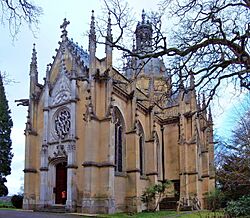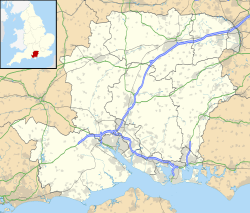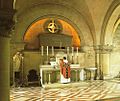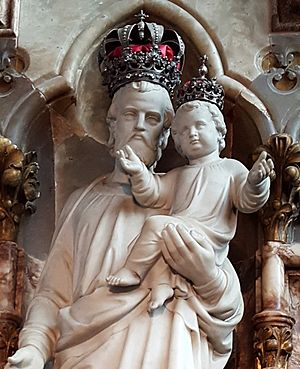St Michael's Abbey, Farnborough facts for kids

Saint Michael's Abbey Church
|
|
| Monastery information | |
|---|---|
| Other names | Farnborough Abbey |
| Order | Order of Saint Benedict |
| Established | 1881 |
| Dedicated to | Saint Michael the Archangel |
| Diocese | Portsmouth |
| Controlled churches | Saint Michael's Abbey Church |
| People | |
| Founder(s) | Empress Eugénie |
| Abbot | Dom Cuthbert Brogan |
| Important associated figures | |
| Site | |
| Location | Farnborough, Hampshire, United Kingdom |
| Coordinates | 51°17′48″N 0°44′59″W / 51.29667°N 0.74972°W |
| Grid reference | SU873560 |
| Public access | Yes |
| Website | https://farnboroughabbey.org |
Saint Michael's Abbey, also known as Farnborough Abbey, is a special place in Farnborough, England. It is a home for Benedictine monks, who are part of a very old religious group. The monks here are known for their beautiful singing during church services, especially using Latin and a style called Gregorian chant. They also have a wonderful pipe organ and print religious books. This abbey is also famous because it holds a special statue of Saint Joseph that was officially crowned by the Pope.
You can take public tours of the abbey every Saturday at 3 PM. The tour includes a visit to the church and the crypt, which is an underground room.
Contents
History of Saint Michael's Abbey
Founding the Abbey
After the Second French Empire ended in 1870, Napoleon III, who was the Emperor of France, his wife Empress Eugénie, and their son, the Prince Imperial, had to leave France. They moved to England. Napoleon III passed away in 1873 and was first buried in a church in Chislehurst.
When their son, the Prince Imperial, also passed away in 1879, Empress Eugénie was very sad. She decided to build a special monument to honor her family. In 1881, she founded Saint Michael's Abbey. She wanted it to be a quiet place for prayer and remembrance for her husband and son.
The Imperial Crypt
The Abbey includes an Imperial Crypt, which is a special burial chamber. It was designed to look like the crypt at Saint-Denis basilica near Paris. This was where Emperor Napoleon III had originally wanted to be buried. Later, Empress Eugénie was also buried there with her husband and son.
All three rest in large stone coffins called sarcophagi. These were given to the family by Queen Victoria.
-
The sarcophagus of Emperor Napoleon III
-
The sarcophagus of Empress Eugénie
-
The sarcophagus of Napoléon, Prince Imperial
Architecture and Monks
The Abbey Church itself was designed by a famous French architect named Gabriel-Hippolyte Destailleur. It has a fancy Gothic style. Inside, you can find a large bone of St Alban, which is the biggest relic of this saint in England.
When the church and monastery were first built, they were managed by a group called Premonstratensian Canons. In 1895, Empress Eugénie changed this. She brought in French Benedictine monks from St Peter's Abbey, Solesmes. A well-known scholar named Dom Fernand Cabrol became the leader of the monks.
The Abbey Organ
The church's organ, which has two keyboards, was put in place in 1905. It was built by a famous company, Aristide Cavaillé-Coll & Company. This organ is very special because it was made with the highest quality of work from that time.
Changes in the Community
Over time, the number of monks at the abbey became smaller. By 1947, many of the remaining monks moved to other Benedictine houses. Farnborough Abbey was then re-established with a small group of English monks from Prinknash Abbey. The last French monk, Dom Leopold Zerr, who was the abbey's organist for many years, passed away in 1956. In 2006, the monks elected their first English Abbot, Dom Cuthbert Brogan.
Catholic National Library
The Catholic Central Library was started after the First World War. It was looked after for many years by the Graymoor Friars in Westminster. In 2007, the library moved to Saint Michael's Abbey. It was then renamed the Catholic National Library. This library has one of the best collections of Roman Catholic books in England. In 2015, the entire collection was moved to Durham University Library.
National Shrine to Saint Joseph
The National Shrine to Saint Joseph at Saint Michael's Abbey is cared for by the monks. A special statue of Saint Joseph is located in a side chapel inside the monastery church. This statue originally belonged to the Mill Hill Fathers.
In 1874, Pope Pius IX officially crowned the statue. This special event was led by Cardinal Manning. The statue was moved to Farnborough Abbey in 2008. This is when the current National Shrine was created. Another statue of Saint Joseph, which used to be at the entrance of the Mill Hill property, was sent to the shrine of Our Lady of Walsingham.
 | Mary Eliza Mahoney |
 | Susie King Taylor |
 | Ida Gray |
 | Eliza Ann Grier |






